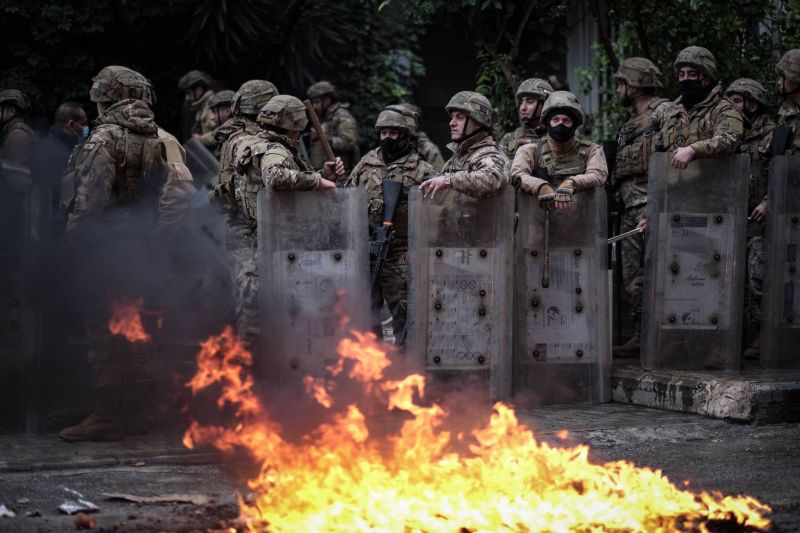
Protests against the government’s failure to provide assistance during the lockdown continued Thursday. (Credit: João Sousa/L’Orient Today)
Want to get the Morning Brief by email? Click here to sign up.
One person died from injuries sustained during Wednesday’s clashes in Tripoli between demonstrators and security forces as protests continued for a fourth day. Omar Farouk Tayba, 30, was pronounced dead Thursday morning. Responding to criticism of the use of force, the Internal Security Forces acknowledged in a statement that its officers had shot live rounds during Wednesday night’s protests, but claimed weapons were fired into the air and in self-defense. Clashes continued in Tripoli for the fourth consecutive night as hundreds of protesters continued to surround the serail, hurling Molotov cocktails and fireworks, setting fires and attempting to break down the entrance to the building. Security forces responded with heavy tear gas to disperse them. Later in the evening, protesters torched city hall. Smaller protests were held in solidarity with Tripoli elsewhere in the country, including in Beirut, where a small group of protesters returned to Riad al-Solh Square, one of the main locations of the Oct. 17 uprising.
Lebanon registered 3,497 new COVID-19 cases and 68 deaths yesterday. Hospitals across the country are still straining under the pressure of an alarming surge that has killed at least 1,166 people since New Year’s Day. ICU hospitalizations were recorded at 938 Thursday, just off the previous day’s record of 945. Doctors have cautioned that while the number of new COVID-19 cases appears to have slowed down, it has yet to make any impact on the number of new patients overflowing into ERs. Nationwide, ICU capacity was at 93.3 percent, according to the World Health Organization’s latest statistics, with Nabatieh’s hospitals at full capacity and ICUs in Beirut just shy of being full.
The Health Ministry launched the national COVID-19 vaccination platform ahead of the arrival of the first batch of Pfizer vaccines, set for mid-February. If all goes as planned, some 249,000 doses will be administered before the end of March, with another 350,000 to be given in the second quarter of the year, 800,175 in the third, and 699,750 in the fourth, covering some 1 million residents with the required two doses. A vaccination strategy released earlier this week aims to inoculate 70 percent of the population by the end of 2021. Residents can now register online to receive the vaccine at covax.moph.gov.lb/impactmobile/vaccine.
The Mount Lebanon prosecutor charged the central bank governor and the head of the Banking Control Commission of Lebanon with criminal negligence and breach of trust in managing dollar subsidies. AFP reported that Ghada Aoun’s decision to file charges comes after she found that dollars that were meant to be sold to food producers and importers at a subsidized rate to curb inflation were instead ending up with money changers who sold them on the black market at a profit. Gov. Riad Salameh is also being investigated by Swiss authorities for alleged large money transfers he had made out of Lebanon. The central bank chief has denied all allegations, claiming that numbers have been exaggerated by the media.
As the end of the month approaches, residents hoping to withdraw their monthly salaries may face challenges due to the COVID-19 lockdown, which has forced banks to close across the country. A spokesperson for the Association of Banks in Lebanon told L’Orient Today that people would be able to withdraw money from ATMs and that the lockdown would not impact their ability to do so; however, many ATMs have run out of cash on previous occasions. Those who are paid with checks will be able to deposit them into their accounts via advanced ATMs — if their bank operates the upgraded machines. The spokesperson said that while banks were closed, internal staff was still working and would clear checks each Thursday. The amount an individual is able to retrieve from ATMs is subject to withdrawal limits.
Correction: The Morning Brief originally reported that a second protester, Osama Ghoumrawy, had died, based on the confirmation of two Tripoli city council members, one of whom forwarded a photo appearing to confirm the protester’s death, as well as an interview with someone who identified himself as a neighbor of the allegedly deceased and multiple media reports of the death. It now appears that an Osama Ghoumrawy did not die, based on calls to multiple Tripoli-area hospitals, which all said no one by that name had been admitted, and a phone interview with a 23-year-old Osama Ghoumrawy from Beddawi, whose picture had been circulated as that of the allegedly deceased, and who told L’Orient Today that he had not attended the protests, been injured or been to the hospital. L’Orient Today regrets the error.